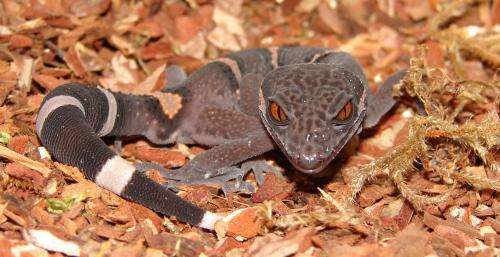Sex-loving, meat-eating reptiles have shorter lives

The health risks and benefits of vegetarianism have long been discussed in relation to the human diet, but newly published research reveals that it's definitely of benefit to the reptile population. That, and being less sexually active! The research team investigated how longevity of 1,014 species of scaled reptiles is influenced by key environmental characteristics and by their feeding and sexual habits.
Snakes and lizards who want to live longer should abstain from sex until late in life, and be vegetarian, according to new research which investigated how reproductive intensity and diet affects reptile lifespan.
An international team of researchers investigated how longevity of scaled reptiles (Lepidosaurs) is influenced by key environmental characteristics and by their feeding and sexual habits.
Based on a worldwide study, involving 1,014 species including 672 lizards and 336 snakes, it was found that a higher frequency of laying or giving birth and early sexual maturation are associated with shortened longevity.
The results have been published in the journal Global Ecology and Biogeography.
Co-author Dr Daniel Pincheira-Donoso, from the School of Life Sciences, University of Lincoln, UK, said: "We observed that more sex (or at least more pregnancies) means shorter life, very much like the rock star adage 'live fast, die young'. Along the same lines, the study revealed that reptiles which sexually mature at a younger age will likely have shorter lives, while those who prefer to delay sexual maturity will probably live longer. And lastly, we found that vegetarians live longer than their carnivorous counterparts. Vegetal food is an intrinsically low-nutrition food, so we think that those who have these diets experience a reduction in reproductive rates, which in turn increases their lifespan."
The results support key predictions from life-history theory and suggest that reproducing more slowly and at older ages and being herbivorous result in increased longevity.
For each species, the team collected literature on body size, earliest age at first reproduction, field body temperature of active individuals, reproductive mode, clutch or litter size and brood frequency, diet and activity time.
They found that long-living scaled reptiles are generally characterised by 'slow' life-history traits: delayed and infrequent reproduction, smaller clutches, larger hatchlings and colder body temperatures. High investment in reproduction, expressed in frequent, large clutches is correlated with short life – but species with large eggs compared to their size live longer.
The team also discovered that herbivores live longer than similar-sized carnivores. Ingestion of a protein-rich diet (meat) may lead to faster growth, earlier and more intense reproduction and hence to shortened longevity. Herbivorous individuals probably consume poorer food, so reach maturity later and live longer. It could also be that hunting is more risky than collecting fruits and vegetables.
Future experiments could test this by feeding a set of species with different diets and exploring the consequences for growth and time to maturity.
In summary, the results support fundamental predictions of life-history theory by showing a link between age at first reproduction, rate of reproduction and longevity.
This study provides the first, large-scale, comparative study of longevity in ectothermic or 'cold-blooded' animals and opens many avenues for further research on the attributes that govern longevity in this group. The results support evolutionary theories of aging in a large group of animals which are not often studied in this context - aging studies usually compare among different mammal (or bird) species, or use experiments with few species of small insects, such as fruit flies.
More information: Inon Scharf, Anat Feldman, Maria Novoslov, Daniel Pincheira-Donoso, Indraneil Das, Monika Bohm, Peter Uetz, Omar Torres- Carvajal, Aaron Bauer, Uri Roll, Shai Meiri 'Late bloomers and baby boomers: ecological drivers of longevity in squamates and the tuatara' Global Ecology and Biogeography onlinelibrary.wiley.com/doi/10 … 1/geb.12244/abstract
Journal information: Global Ecology and Biogeography
Provided by University of Lincoln



















